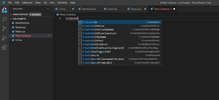- Joined
- Jul 12, 2021
- Messages
- 97
There are three questions I have.
In the next trigger is it possible to put a single event instead of many?
In the next trigger is it possible to put a single action instead of many?
Finally, if the answer to my questions is no, would the answer be yes if Jass or Lua were used instead of GUI?
In the next trigger is it possible to put a single event instead of many?
-
 Untitled Trigger 005
Untitled Trigger 005
-

 Events
Events
-


 Time - DeathWardTimerB[1] expires
Time - DeathWardTimerB[1] expires
-


 Time - DeathWardTimerB[2] expires
Time - DeathWardTimerB[2] expires
-


 Time - DeathWardTimerB[3] expires
Time - DeathWardTimerB[3] expires
-


 Time - DeathWardTimerB[4] expires
Time - DeathWardTimerB[4] expires
-


 Time - DeathWardTimerB[5] expires
Time - DeathWardTimerB[5] expires
-


 Time - DeathWardTimerB[6] expires
Time - DeathWardTimerB[6] expires
-
-

 Conditions
Conditions
-

 Actions
Actions
-
In the next trigger is it possible to put a single action instead of many?
-
 BloodPactDamage Copy
BloodPactDamage Copy
-

 Events
Events
-


 Time - TimerBloodPact[0] expires
Time - TimerBloodPact[0] expires
-


 Time - TimerBloodPact[1] expires
Time - TimerBloodPact[1] expires
-


 Time - TimerBloodPact[2] expires
Time - TimerBloodPact[2] expires
-


 Time - TimerBloodPact[3] expires
Time - TimerBloodPact[3] expires
-
-

 Conditions
Conditions
-

 Actions
Actions
-


 If ((Units[0] has buff Blood Pact (SkeletonWarrior)) Equal to True) then do (Countdown Timer - Start TimerBloodPact[0] as a One-shot timer that will expire in 1.00 seconds) else do (Do nothing)
If ((Units[0] has buff Blood Pact (SkeletonWarrior)) Equal to True) then do (Countdown Timer - Start TimerBloodPact[0] as a One-shot timer that will expire in 1.00 seconds) else do (Do nothing)
-


 If ((Units[1] has buff Blood Pact (SkeletonWarrior)) Equal to True) then do (Countdown Timer - Start TimerBloodPact[1] as a One-shot timer that will expire in 1.00 seconds) else do (Do nothing)
If ((Units[1] has buff Blood Pact (SkeletonWarrior)) Equal to True) then do (Countdown Timer - Start TimerBloodPact[1] as a One-shot timer that will expire in 1.00 seconds) else do (Do nothing)
-


 If ((Units[2] has buff Blood Pact (SkeletonWarrior)) Equal to True) then do (Countdown Timer - Start TimerBloodPact[2] as a One-shot timer that will expire in 1.00 seconds) else do (Do nothing)
If ((Units[2] has buff Blood Pact (SkeletonWarrior)) Equal to True) then do (Countdown Timer - Start TimerBloodPact[2] as a One-shot timer that will expire in 1.00 seconds) else do (Do nothing)
-


 If ((Units[3] has buff Blood Pact (SkeletonWarrior)) Equal to True) then do (Countdown Timer - Start TimerBloodPact[3] as a One-shot timer that will expire in 1.00 seconds) else do (Do nothing)
If ((Units[3] has buff Blood Pact (SkeletonWarrior)) Equal to True) then do (Countdown Timer - Start TimerBloodPact[3] as a One-shot timer that will expire in 1.00 seconds) else do (Do nothing)
-
-
Finally, if the answer to my questions is no, would the answer be yes if Jass or Lua were used instead of GUI?
















